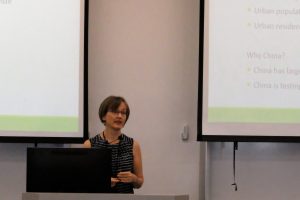Given the decentralisation of decision-making powers in China, sub-municipal governments have become principal actors in policy implementation. University Lecturer and Docent Outi Luova, Director of the Finnish University Network for Asian Studies and Vice Director of the Centre for East Asian Studies (CEAS) at the University of Turku, a member institution of the Finnish China Law Center, is investigating this phenomenon from the perspective of environmental law and policy.
Luova’s current research investigates how China’s environmental governance is imbued with local experiments and variation. She has found that enforcement of environmental regulations varies greatly.
‘There are striking differences in enforcement between the bureaucratic North and flexible South, and the wealthy East and less-developed West’, Luova says.
‘The recent re-centralization efforts and stricter environmental policy enforcement have not been effective in diminishing variation because of strong local interests and weak capacities in many cities’.
According to Luova, slack enforcement means that there can be large diversity in implementation even among sub-municipal units in a city.
‘It is therefore very important to pay attention to regional variation when dealing with China’.
‘Mega-city districts are nowadays powerful actors. With sub-municipal variation remaining unexplored, my recent research project has analysed the implementation of environmental policies and regulations in three urban districts in the city of Tianjin’, she says.

In conducting her in-country research, Luova has faced increasing challenges in obtaining official documents and arranging interviews with Chinese civil servants as a result of a ‘tightening political atmosphere’.
‘I have been able to conduct interviews only thanks to my simultaneous participation in official sister-city delegation visits to Tianjin’, Luova says.
‘During my visits to China, I arranged focus-group interviews at city and district level departments of education and environmental protection. I also had a possibility to visit several so called “green schools” in Tianjin and get acquainted with local environmental NGOs’.
In addition to urban governance in China, Luova’s teaching and research interests include regional cooperation in East Asia, domestic migration in China, management of international labour migration in China and East Asia, ethnic issues in China and more generally, regional features and differences in China.
Luova also guest lectures in China. During her most recent visit to China from September to October 2017, she taught at the University of Science and Technology of China and Zhejiang University on low-carbon urban governance.
Luova’s research on regional differences in the implementation and enforcement of environmental law and policy in China, ‘Environmental policies enter the educational sector: Different shades of green at district level’, will be published in Greening China’s Urban Governance: Tackling Environmental and Sustainability Challenges (Jørgen Delman, Ren Yuan, Outi Luova, Mattias Burell, Oscar Almén eds) by Springer in 2018. Other related publications are also in the pipeline.
Luova can be contacted via outluo (at) utu.fi.
